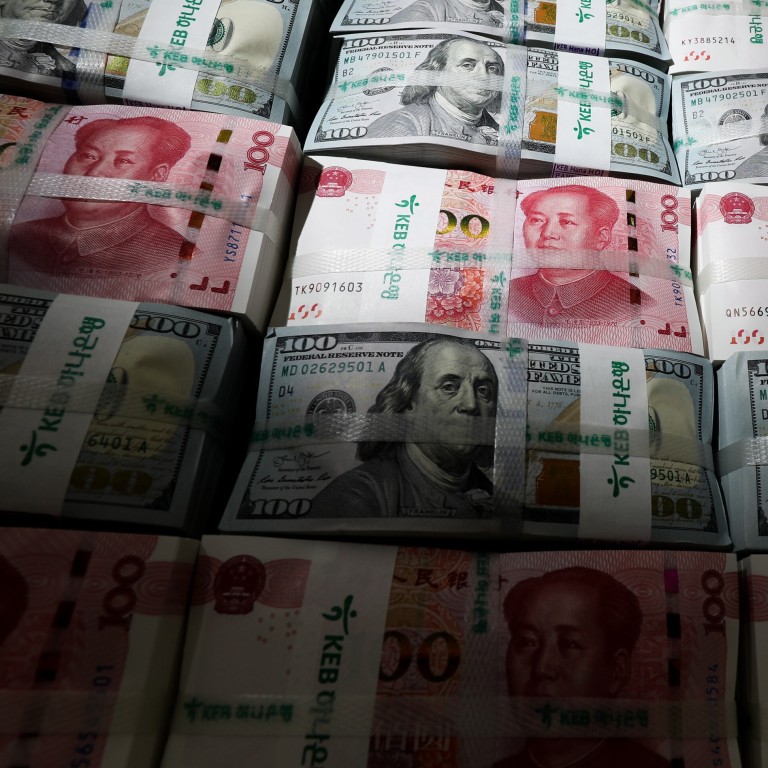
US ruling on China’s alleged yuan undervaluation could stoke further rift in relations
- US Department of Commerce due to release findings next week on whether Chinese yuan is undervalued and so constitutes an economic subsidy
- The ruling could set an important precedent, paving the way for the yuan exchange rate to be used to determine possible trade penalties
As the Trump administration intensifies its economic pressure on China, analysts are wondering if the yuan’s exchange rate will be dragged back into the middle of the dispute.
The US is due to conclude its preliminary investigation into whether the yuan is being undervalued to give Chinese exporters an advantage on Monday.
The US Department of the Treasury said in a statement it had provided its assessment to the commerce department “consistent with the priority of the Trump Administration to address unfair currency practises”.
The investigation into tiny wire and plastic fasteners used to seal packages could set a big precedent, paving the way for the highly controversial idea of using the yuan exchange rate to determine possible trade penalties.
US President Donald Trump has long accused China of “ripping off” the US, including manipulating its currency to boost exports, and has threatened to decouple the two economies.
Peter Quinter, a lawyer at Florida-based law firm Gray Robinson, said if the US Commerce Department concluded China was intentionally undervaluing the yuan Washington could expand duties on a range of Chinese products.
It could also lead to tighter restrictions on some exports to China, Chinese investment in the US, and US work visas for Chinese citizens, said Quinter, who chairs the American Bar Association’s customs and international trade law section.
“The [Office of the United States Trade Representative] describes this as getting tough with China,” Quinter said. “[But] such actions are not only unproductive, they are counterproductive.”

01:46
Oracle reaches deal to become TikTok’s ‘technology partner’, after Microsoft offer is rejected
Jim Walker, chief economist at Aletheia Capital, said treating the exchange rate as a subsidy in trade investigations would be “yet another act of self-harm”.
Nevertheless, the value of the yuan could move back into the global spotlight, especially as China had racked up a massive trade surplus following its suppression of the coronavirus pandemic, said Alexander Wolf, head of investment strategy in Asia at JPMorgan Private Bank.
Nevertheless, the value of the yuan could be an issue that moves back into the global spotlight, given China’s massive trade surplus following its suppression of the coronavirus pandemic, said Alexander Wolf, head of investment strategy in Asia at JPMorgan Private Bank.
Demand has surged for China’s exports of work-from-home consumer electronics as well as medical devices and pharmaceutical ingredients, raising questions as to whether the yuan’s value should have appreciated more, Wolf said.
Under a new rule published in February, the US Commerce Department is allowed to declare currency undervaluation by a foreign country as a form of economic subsidy liable for sanctions under the US Tariff Act of 1930, as well as other regulations under the law.
But analysts said determining undervaluation would be extremely complicated.
Furthermore, the yuan hit a one-year high this month after surging 5.7 per cent against the US dollar since May, although much of its appreciation was due to a weaker dollar, with the US dollar index against its major trading partners down 9.5 per cent over the last six months. The yuan has increased much less against a basket of currencies from China’s major trading partners and is still trading well below its March peak.
The People’s Bank of China pledged again last month to maintain “the basic stability of the yuan”, meaning China was not attempting to undervalue its currency.
“The yuan exchange rate is mainly determined by market supply and demand. The central bank will not use the yuan exchange rate as a tool to deal with disruptions from trade frictions,” China’s central bank said in its second quarter monetary policy report.
In January, a US Treasury report to Congress on the foreign exchange policies of major trading partners said China had a “long history” of undervaluing the currency and it took “concrete steps” to devalue the yuan over summer.
On the other hand, the International Monetary Fund said in August last year that China‘s central bank had made few inventions into the foreign-exchange market and the yuan was “broadly in line with medium-term fundamentals”.
China’s measures so far taken in response to pressures from the US and Europe show it is trying very hard to stop decoupling
In return, China promised to make enforceable commitments to refrain from competitive devaluation. China also agreed to publish relevant information related to exchange rates and external balances.
Chen Xingdong, chief China economist at BNP Paribas, said that the US decision to lift the designation suggested there was no reason to label the yuan as undervalued.
However, Trump could still adopt punitive measures if he wanted to increase economic pressure on China, Chen said.
“I think this is a game to see how the two sides will play. China’s measures so far taken in response to pressures from the US and Europe show it is trying very hard to stop decoupling. China really wants to be reconnected,” Chen said.

